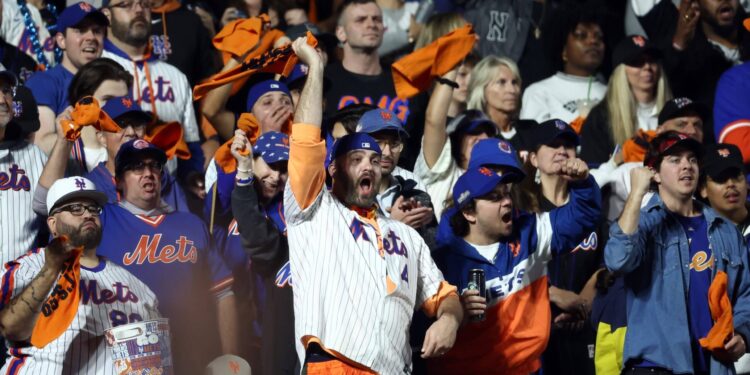DALLAS — This is how you slay a negative perception. This is how you rebrand a franchise. This is how you deliver for your fan base.
On Sunday night, the Mets signed Juan Soto to the largest contract in the history of professional sports — a 15-year, $765 million pact, according to sources briefed on the terms, that smashes the present-day value of the previous record-holder in baseball by more than $300 million.
It’s a where-were-you moment for a fan base accustomed to experiencing those in a less positive context.
Before diving into what this means for the lineup, the payroll from now through 2039, the competitive outlook for the rest of the offseason or the ins and outs of the aging curve, Mets fans should take a moment and smile. Bask in this feeling. You haven’t experienced it often enough.
It isn’t just that a franchise that spent more than a decade crying poor because it handed its cash to the wallet inspector has become the behemoth it should have been all along. It isn’t just that it made this seismic investment in a player who has as good a chance as any of fulfilling the contract’s promise. It isn’t just that that player joins a team coming off a revitalizing season that ended just shy of a pennant.
It’s undeniable: This means something extra to Mets fans because they beat the Yankees, because a player the Yankees had and wanted to bring back preferred playing his home games in Queens. It meant more, as president of baseball operations David Stearns said, to clinch last season’s playoff berth in Atlanta, exorcising demons along the way. And it means so very much to the fan base now to see their friends, their coworkers, their acquaintances turned baseball nemeses feel the flip side of the coin.

This is probably how Mets fans feel about the team signing Juan Soto. (Vincent Carchietta / Imagn Images)
For so long, the Mets have been defined by who and what they were not. They weren’t the Dodgers or Giants when they arrived in New York in 1962. They have never been the perennial contender the Yankees have been for, oh, a century or so. They have been cast, in the phrase you know I’m about to say, as a little brother.
Think about being a Mets fan under 40, just too young to remember a championship or the full excitement of the 1980s. As a child, you sat in classrooms filled with Yankees fans, some serious, most bandwagoners, who held their dynasty over your head. You grew up with interleague play and the Subway Series each summer, making three games feel like a referendum on your life choices. You treasured those rare moments of breakthrough — Dave Mlicki’s shutout, Matt Franco off Mariano Rivera, that anomalous home-and-home sweep in 2013 — as keepsakes, sometimes literally. (Perhaps the homemade scorecard from that 9-8 win in ’99 still sits in a dusty shoebox in the closet of your childhood bedroom.)
A moment like this — outbidding the Yankees for an in-his-prime Yankees star — felt unfathomable, even before Bernie Madoff, before the Mets held up the likes of Frank Francisco and Michael Cuddyer and Wilson Ramos as critical offseason additions.
And for even the most ardent cynic — a spirited competition among Mets fans — Steve Cohen has met the hype that accompanied his purchase of the team more than four years ago. He came in talking about changing the franchise’s perception, and when it mattered most this winter, he’d established enough of a reputation to win over Soto. Cohen did that by spending at high levels even when it didn’t produce immediate returns, by brushing off the idea of getting under the luxury tax, by never being quite as explicit about regulating his payroll as Hal Steinbrenner across town.
“You can’t change the perception without changing the reality,” Sandy Alderson said the day Cohen was introduced as team owner.
Four years later, the reality around the Mets has indeed changed. It’s become, well, surreal. This is who the Mets are now.
(Top photo: Rob Tringali / MLB Photos via Getty Images)







